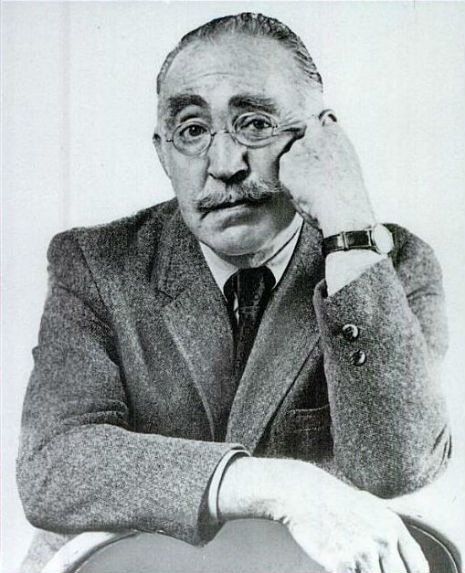Yesterday, when I posted that great Jonathan Winters interview, I found another episode from the archives of the Day for Night public television series that made me want to jump for joy: A 30-minute interview with the great American humorist S.J. Perelman from 1974. I’ve already watched it twice.
Although he is by now, some thirty-odd years after his death, almost completely forgotten, S.J. Perelman was once considered a very big deal man of letters, up there with greats like George S. Kaufman, James Thurber and E.B. White. Today he is best remembered for something that pained him to be associated with during his lifetime: his screenwriting for the Marx Brothers. (Perelman co-wrote two of their greatest comedies, Monkey Business and Horse Feathers, but famously said of his tenure with the Marx Brothers: “I did two films with them, which in its way is perhaps my greatest distinction in life, because anybody who ever worked on any picture for the Marx Brothers said he would rather be chained to a galley oar and lashed at ten-minute intervals until the blood spurted from his frame than ever work for those sons of bitches again.”)
An admirer of both Ring Lardner and James Joyce, Perelman’s deliriously complicated prose—written mostly for The New Yorker from 1934 until the end of his life—was densely constructed with puns, literary and historical allusions, ridiculous names, foreign phrases and double and triple entendres. For an American, Perelman was a particularly well-traveled and erudite man. He went to the Far East several times in his life and many of his most famous essays are travelogues. Perelman usually wrote in the first person, portraying himself as a snobby ur-sophisticate beset by his own (unobserved) comic ineptitude. He was a master of the English language with a massive vocabulary that would send readers to their dictionaries several times per page. All of the various idiosyncrasies and uniquely Perelman-esque tropes and over-excessive wordsmithery combined to form a literary style no less distinctive than Shakespeare’s.
It’s next to impossible to accurately describe the S. J. Perelman gestalt, so here are a few choice quotes and passages:
“And you were cruel,” I said.
“I’m sorry,” added Quigley.
“Why did you add Quigley?” I begged him. He apologized and subtracted Quigley, then divided Hogan. We hastily dipped the slices of Hogan into Karo, poured sugar over them, and ate them with relish.
—- From “The Love Decoy”
“Have a bit of the wing, darling?” queried Diana solicitously, indicating the roast Long Island airplane with applesauce. I tried to turn our conversation from the personal note, but Diana would have none of it. Soon we were exchanging gay banter over the mellow Vouvray, laughing as we dipped fastidious fingers into the Crisco parfait for which Diana was famous. Our meal finished, we sauntered into the play-room and Diana turned on the radio. With a savage snarl the radio turned on her and we slid over the waxed floor in the intricate maze of the jackdaw strut.
—- From “Strictly from Hunger”
Love is not the dying moan of a distant violin, it’s the triumphant twang of a bedspring.
Woody Allen absolutely revered Perelman and Allen’s early New Yorker pieces often read like he was trying to ape the humorist’s distinctive prose style. Through the rediscovery of the Marx Brothers that occurred in the late1960s on college campuses and Allen’s constant championing of Perelman’s work, his star rose again towards the end of his life. When I was a kid, his books were readily stocked in every library and bookstore. His name and fame were widely known. Today there is but a single book of his in print, the anthology The Most of S.J. Perelman (with an introduction by Steve Martin) although all of his books can be easily found used online.
This interview with S.J. Perelman is a gem. It’s always fascinating to hear a writer’s voice you admire for the first time and I must admit that Perelman’s heavy New York accent is not what I expected (I suppose I always heard his voice as having a British accent in my mind’s ear.)
Below the famous passport scene from Monkey Business:






